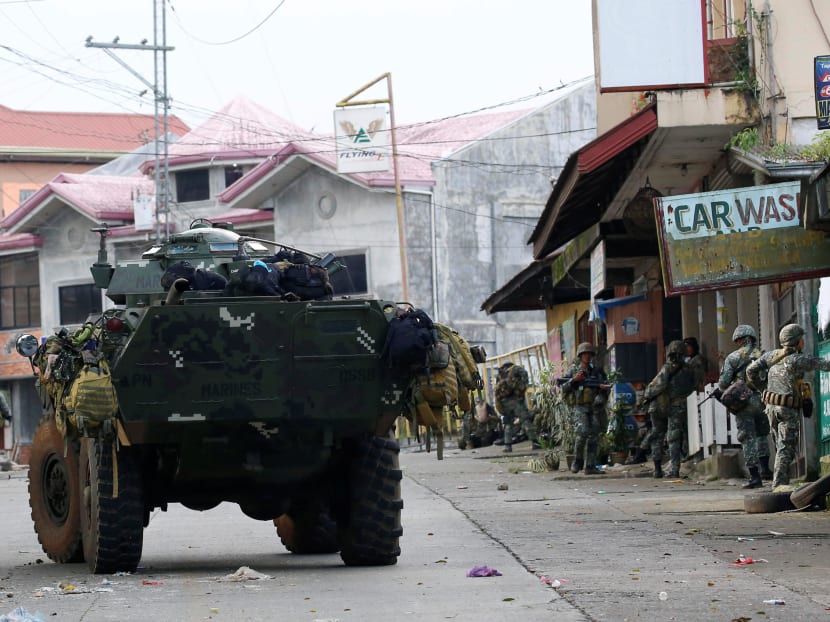28 Malaysians among militants in besieged Philippine city
KUALA LUMPUR — Twenty-eight Malaysians are said to have joined Islamic State (IS)-linked militants in the battle against Philippine military forces in Marawi City on Mindanao island.

Members of Philippine Marines advance their positions as they prepare to assault the Maute group in Marawi City in southern Philippines May 28, 2017. Photo: Reuters
KUALA LUMPUR — Twenty-eight Malaysians are said to have joined Islamic State (IS)-linked militants in the battle against Philippine military forces in Marawi City on Mindanao island.
The alleged involvement of Indonesians with the outlawed Maute terror movement has further stoked fears of a regional network of militants.
“Intelligence from ground operatives disclosed 28 Malaysians arrived in Marawi early last week for a religious event. We suspect there must be more who arrived separately,” said a Manila-based intelligence official to Sunday Mail.
“Initially, nobody knew what happened to them ... but after the deaths of two Malaysians in firefights with the armed forces, we can conclude they too took up arms.”
There are also those from the Middle East in Marawi City or on the outskirts, the official added.
It is believed that there is close affinity between Maute fighters with Indonesian militants. “One of their (Maute) founding leaders Omar Khayam is married to a woman from Indonesia, whom he met while he was studying in Egypt,” the official said.
Over the weekend, the Filipino military intensified a bombing campaign on parts of Marawi, one of the biggest Muslim cities in the mainly Catholic nation, as it accused militants of atrocities including murdering women and a child.
“The airstrikes was to stop the terrorist rampage, which could have led to a high death toll,” said the intelligence official.
The violence began when dozens of gunmen went on a rampage throughout Marawi in response to an attempt by security forces to arrest Isnilon Hapilon, a veteran Filipino militant regarded as the local leader of IS. The initial fighting prompted President Rodrigo Duterte to declare martial law on last Tuesday across the southern third of the Philippines. His administration has said that Malaysians, Indonesians and other foreigners were among the guerrillas killed during the fighting.
Deputy Prime Minister Ahmad Zahid Hamidi said the two Malaysians who were killed in Southern Philippines did not possess true Islamic education.
“They did not have any Islamic education, but they wanted to be martyrs,” he said, adding that those who did not understand the Quran were more inclined to engage in terrorism, as they often misinterpreted the scriptures.
Indonesia is still reeling from a suicide bomb attack at a bus station last Wednesday (May 24). The attack, which has been claimed by IS, killed three police officers and wounded 12 others. Authorities have arrested three suspects.
At a press briefing last week, Philippines Armed Forces spokesman Brigadier General Restituto Padilla said there were foreigners who had “long been in the country aiding in the terrorist activities”. He identified Singaporeans, Malaysians and Indonesians as part of the group.
Last Friday, the Ministry of Home Affairs (MHA) said that a Singaporean man who has been in south Philippines since the 1990s has been implicated in terrorism activities there.
But MHA added that there is no indication if the man, Muhamad Ali s/o Abdul Rahiman @ Muawiya, is involved in the ongoing armed insurgency in Marawi.
Meanwhile, the Indonesian government said on Saturday that 11 people had been evacuated from Marawi. Ten of them the evacuees were there to perform khuruj, an Islamic practice of traveling around the world to spread the message of the religion.
“So far, there has been no confirmation about their involvement with the Maute group, IS, or other terror groups involved in the clashes in Marawi,” Foreign Ministry spokesman Arrmanatha Nasir said. AGENCIES






